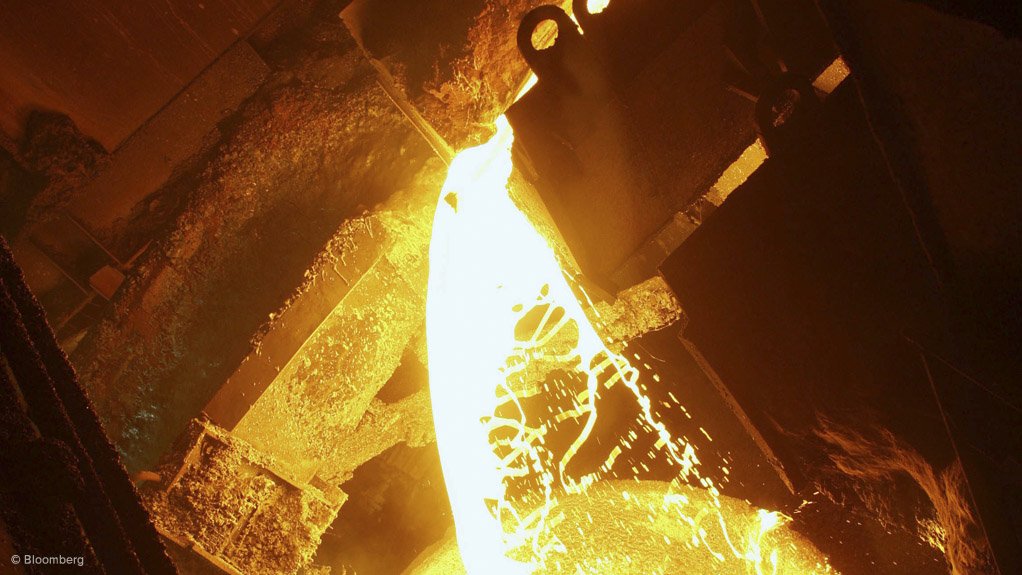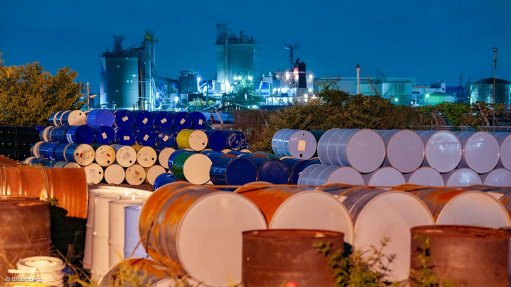Steel demand expected to increase by 1.8% this year, 1.9% in 2024 – worldsteel
The World Steel Association (worldsteel), in an update of its Short Range Outlook (SRO) for 2023 and 2024, forecasts that steel demand will grow by 1.8% this year to 1.81-billion tons after having contracted by 3.3% in 2022.
Steel demand is forecast to increase by a further 1.9% in 2024 to 1.85-billion tonnes, worldsteel estimates.
“Steel demand has been feeling the impact of the high inflation and interest rate environment. Since the second half of 2022, the activities of steel-using sectors have been cooling sharply both for most sectors and regions as both investment and consumption weakened. The situation continued into 2023, particularly affecting the European Union (EU) and the US,” said worldsteel economics committee chairperson Máximo Vedoya.
“Considering the delayed effect of the tightening monetary policy, we expect steel demand recovery in 2024 to be slow in the advanced economies. Emerging economies are expected to grow faster than developed economies, but the performance of emerging economies continues to diverge, with emerging Asia maintaining resilience,” he said.
worldsteel expects the situation in China’s property market will stabilise in the latter part of the year and China’s steel demand will record slight positive growth thanks to government measures. The 2024 outlook for China remains uncertain depending on the policy directions to tackle the current economic difficulties.
“The Chinese economy is in a structural transition phase that may add volatility and uncertainty. Other uncertainty is linked to regional conflicts and unrest such as in Russia and Ukraine, Israel and Palestine, and elsewhere. This could contribute to rising oil prices and further geo-economic fragmentation, both of which are downside risks,” Vedoya noted.
Further, it is worth noting that, despite the weakening of construction activities owing to high interest rates, infrastructure investment is showing positive momentum in many regions even in the advanced economies, reflecting the effect of decarbonisation efforts, he added.
In general, the global economic outlook continued to worsen under the influence of monetary tightening that hurt consumption and investment alike. Inflation started to moderate in 2023 owing to the slowing economy, which may allow the ending of the monetary tightening cycles in 2024.
However, the war against inflation is not over and continues to be threatened by multiple factors: persistent core inflation and a tight job market and rising oil prices, worldsteel said in its outlook.
The construction sector has been negatively affected by the high interest rates and high-cost environment, especially the residential sector. However, infrastructure investment remained positive and is cushioning the impact to some extent.
Additionally, despite the easing of supply chain bottlenecks, the manufacturing sector continues to slow under weakening demand. The consumer durables sector has been particularly affected.
The recovery in auto production will continue in 2023, helped by the order backlogs and easing of supply chain bottlenecks, allowing high growth in many regions, but the sector is expected to decelerate in 2024, the association said.
Meanwhile, steel demand dynamics in emerging and developing economies continue to diverge, with developing Asia, excluding China, remaining resilient to global headwinds. Steel demand in emerging and developing economies excluding China will show growth of 4.1% in 2023 and 4.8% in 2024, after having fallen by 0.6% in 2022.
Egypt’s steel demand continues to suffer from the impact of the Russia-Ukraine war. High interest rates, severe currency depreciation, limited access to foreign currency, and higher production costs are leading to the suspension of megaprojects. The situation is expected to improve slightly in 2024 as inflation is expected to peak in the second half of this year.
Comments
Press Office
Announcements
What's On
Subscribe to improve your user experience...
Option 1 (equivalent of R125 a month):
Receive a weekly copy of Creamer Media's Engineering News & Mining Weekly magazine
(print copy for those in South Africa and e-magazine for those outside of South Africa)
Receive daily email newsletters
Access to full search results
Access archive of magazine back copies
Access to Projects in Progress
Access to ONE Research Report of your choice in PDF format
Option 2 (equivalent of R375 a month):
All benefits from Option 1
PLUS
Access to Creamer Media's Research Channel Africa for ALL Research Reports, in PDF format, on various industrial and mining sectors
including Electricity; Water; Energy Transition; Hydrogen; Roads, Rail and Ports; Coal; Gold; Platinum; Battery Metals; etc.
Already a subscriber?
Forgotten your password?
Receive weekly copy of Creamer Media's Engineering News & Mining Weekly magazine (print copy for those in South Africa and e-magazine for those outside of South Africa)
➕
Recieve daily email newsletters
➕
Access to full search results
➕
Access archive of magazine back copies
➕
Access to Projects in Progress
➕
Access to ONE Research Report of your choice in PDF format
RESEARCH CHANNEL AFRICA
R4500 (equivalent of R375 a month)
SUBSCRIBEAll benefits from Option 1
➕
Access to Creamer Media's Research Channel Africa for ALL Research Reports on various industrial and mining sectors, in PDF format, including on:
Electricity
➕
Water
➕
Energy Transition
➕
Hydrogen
➕
Roads, Rail and Ports
➕
Coal
➕
Gold
➕
Platinum
➕
Battery Metals
➕
etc.
Receive all benefits from Option 1 or Option 2 delivered to numerous people at your company
➕
Multiple User names and Passwords for simultaneous log-ins
➕
Intranet integration access to all in your organisation




















